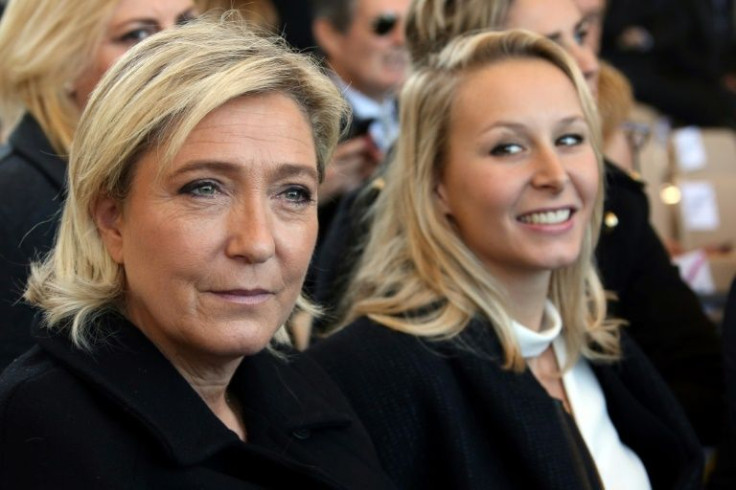New Le Pen Family Feud Looms Ahead Of French Election
The bitter personal rivalries inside France's far-right Le Pen dynasty burst into the open again on Friday, threatening to undermine the family's matriarch and presidential candidate Marine just over two months from elections.
Marine Le Pen, 53, spoke of her pain on Friday after learning that her ambitious young niece Marion was considering publicly backing a rival in this April's polls.
"I have a very unique story with Marion because I brought her up along with my sister for the first years of her life, so obviously it's brutal, it's shocking, it's difficult for me," Le Pen told CNews.
Marion Marechal, who is more than 20 years younger than her aunt, has long been seen as a rival heir in the anti-immigration and ultra-nationalist family that has dominated far-right politics in France for five decades.
Marechal told Le Parisien newspaper on Thursday she was still thinking about who to support while dropping heavy hints she would opt for Eric Zemmour, an anti-Islam pundit and bitter rival of her aunt.
"No decision has been taken," said Marechal, who dropped the Le Pen family name in 2018.
"If I support Eric, it won't just to be to stick my head in and say hello: it would mean coming back to politics," she added.
Such a move could add momentum to Zemmour's campaign, which has stagnated since November, and would likely lead to other figures from Le Pen's National Rally (RN) party switching sides.
"Lots of people in the RN are trying to find out what I'm going to do," Marechal told Le Parisien. "Some of them say their decisions to leave depend on me."
Polls currently indicate that Marine Le Pen is the more likely of the two far-right candidates to make it into the second round of the election on April 24, but analysts say the race is highly unpredictable.
Surveys make centrist President Emmanuel Macron the favourite.

Relations within the Le Pen clan are notoriously stormy, with Marine clashing repeatedly with her father Jean-Marie after taking over his National Front party in 2011.
Jean-Marie, a 93-year-old former paratrooper in frail health, took to Twitter to say he hoped to speak with his daughter and grand-daughter in the coming days.
"I will give my thoughts at another time when I judge it to be useful," he wrote.
He too is not certain to support his daughter, saying in October that he would back "the best-placed candidate from the national camp" and praising Zemmour for his hardline rhetoric on Islam and immigrants.
In 2015, Marine Le Pen threw Jean-Marie out of the party he co-founded in the 1970s after he repeated his view that the Holocaust was a mere "detail" of World War II.
At the heart of the jockeying within the family is a fight over political strategy, as well as the leadership of France's far-right movement if neither Le Pen, nor Zemmour succeed in their campaigns this April.
Marion Marechal is seen by may observers to be a future leader of far-right nationalist camp.
In her third tilt at the presidency, Marine Le Pen is seeking to project an image of moderation and seriousness.
Long seen as lacking stature and ridiculed after a weak presidential debate performance in 2017, Le Pen is focusing on the economy and jobs while criticising Zemmour for his "brutality" and "provocations" on race and Islam.
"You won't see over-statements or excesses from me," she said on Wednesday. "There won't be a race to be the most radical or create a buzz."
Hardliners in her party consider her to have gone too far into the mainstream and prefer Zemmour who has several convictions for hate speech and claims white French people are being deliberately "replaced" by immigrants.
While Le Pen was pledging no more "provocations" on Wednesday, Zemmour was promising that introducing "zero immigration" to France would put an end to delinquency.
Asked whether he was implying that all delinquents were immigrants during an interview on the Public Senat channel, he replied: "Yes, well, immigrants or children of immigrants."
Elected as the youngest member of parliament in 2012 at the age of 22, Marion Marechal stepped back from frontline politics five years later to spend more time with her daughter and open a political sciences school focused on nationalism.
© Copyright AFP {{Year}}. All rights reserved.





















